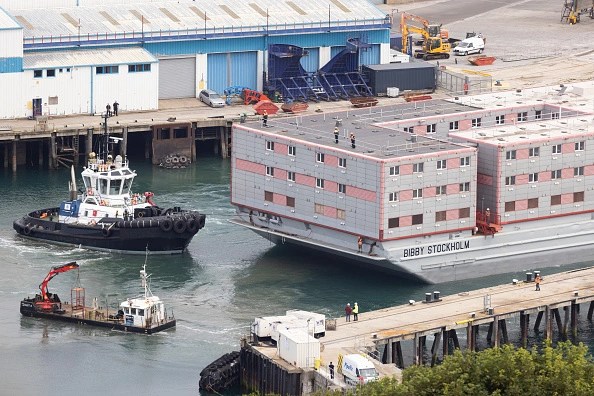Explainer: Sunak’s plan to house asylum seekers on ships and barges is sinking

Rishi Sunak’s plan to house asylum seekers on ships and barges is dwindling – or rather, slowly sinking. The government had to return two cruise ships it had acquired yesterday after it found nowhere to dock them.
Last month, while giving more details on the Bibby Stockholm, the barge arrived in Portland yesterday that will host 500 male asylum seekers, Rishi Sunak proudly announced he had further plans. He later unveiled the government had bought two cruise ships to house asylum seekers waiting for a decision on their asylum request.
One of them was going to be docked in Liverpool – but the port operator refused to accept the task, saying that without enough support from local authorities, they wouldn’t have been able to manage the situation. The second ship was meant to moor near Edinburgh, but the plan fell through.
It’s a blow to Sunak, who is betting a lot of his political credibility on “stopping the boats” and cutting on the high cost of housing asylum seekers in the UK during a housing crisis. But even before these developments, the plan had been controversial.
The barge was used once to house asylum seekers in the Netherlands, around 2008. During that time a man died from a cardiac arrest. Other individuals living on the barge claimed he hadn’t received proper medical care, and denounced conditions on the barge as not fit for habitation.
The barge was subsequently renovated and used to house Petrofac workers building the Shetland Gas Plant. It has undergone further work to be prepared for its use in Portland, but still there are concerns that it won’t provide suitable accommodation. Asylum seekers won’t be able to come and go as they please; they won’t even be able to spend time in the port. Local agencies will decide where they can go in the local area and provide buses to take them to and fro.
Sunak has framed the plan as a great alternative to the expensive hotels, which cost somewhere between £5.6m and £7m a day. But according to a report from NGOs Reclaim the Seas and One Life to Live, the Home Office will save only around £10 a day on each asylum seeker by housing them on barges. According to sources in the industry, the government is paying around £15,000 just for the lease of the barge.
With little clarity on when the new migration rules – which include deportation to third countries – will come into effect, the barge is likely to become potentially long-term accommodation for many people. The government currently has a contract with the company providing the barge for an 18 months lease.
The first asylum seekers are expected to arrive on the Bibby Stockholm at some point next week. The Home Office wants to introduce them to the barge in small groups: it will be around 50 individuals who’ll set foot on the floating platform first.
But the real test for Sunak’s plan will be when the barge reaches its full capacity of 500 people. If the barge poses the same problems it did in the Netherlands fifteen years ago, the prime minister will have categorically failed.